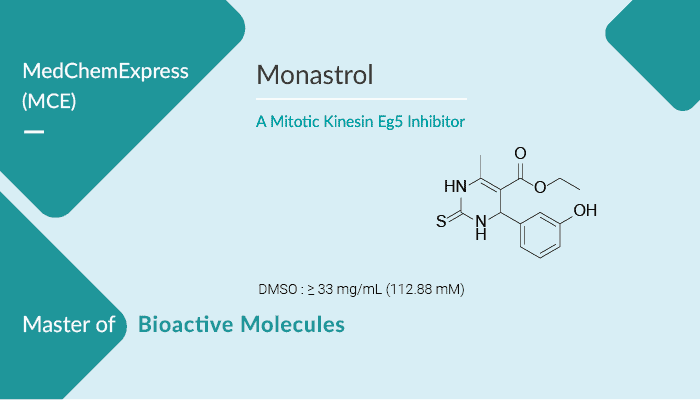Kinesin, a member of microtubule-associated proteins, plays an important role in spindle assembly and chromosome movements during cell division. The kinesin motor protein family consists of 14 distinct subclasses and 45 kinesin proteins in humans. Kinesin uses the energy of ATP hydrolysis to move along the surface of, or destabilize, microtubule filaments. Roles of kinesin in diseases typically involve defective transport of cell components, transport of pathogens, or cell division. Kinesin possesses essential function(s) in both the mitotic and the meiotic cell cycle.
Mitotic kinesin plays a critical role in the regulation of microtubule organization and dynamics. In vertebrates, kinesin-5 motors are evolutionarily conserved motor proteins with plus-end-directed motility. In humans and Xenopus, kinesin-5 Eg5 forms homotetramers to bundle and slide microtubules in dividing cells. Besides, Eg5 is essential for spindle pole separation. After Eg5 inhibition, the bipolar spindle collapses into the monopolar spindle within unseparated sister chromatids. What’s more, Eg5 inhibition results in monopolar spindle and the polyploidy. To date, several chemical compounds targeting kinesin-5 Eg5 have been identified. Eg5 inhibition activates the spindle assembly checkpoint and induces cell cycle arrest in human cancer cells. Therefore, Eg5 inhibitors are useful tools for studies about biological functions of Eg5.
Monastrol is a cell-permeable inhibitor of the mitotic kinesin Eg5.

Monastrol is a potent and cell-permeable inhibitor of the mitotic kinesin Eg5. Specifically, Monastrol binds to a long loop that is specific to the Eg5 kinesin family. And it can allosterically inhibit ATPase activity of the kinesin. Importantly, Monastrol arrests cells in mitosis by specifically inhibiting Eg5. Moreover, Monastrol treatment of dividing cells results in spindle collapse and cell cycle arrest with a monoastral spindle. Monastrol exhibits an antiproliferative effect against several cell lines. Monastrol treatment can decrease cell viability in MCF-7 tumor cells.
All in all, Monastrol, a potent and cell-permeable inhibitor of the mitotic kinesin Eg5, has potential for cancer research.
Reference:
She ZY, et, al. Cell Div. 2020 Mar 6;15:6.